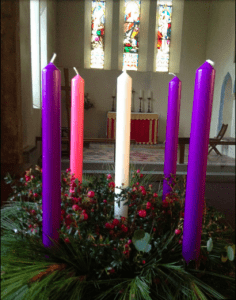 This post is by Tim Spivey, pastor at New Vintage Church.
This post is by Tim Spivey, pastor at New Vintage Church.
I wasn’t raised in a tradition known for its robust celebration of Advent. We weren’t entirely anti-Christmas. Christmas itself was great—it just didn’t have a lot to do with Christianity, as we saw it. Over the years, my mind has completely changed on this. In fact, Advent and Christmas have come to be one of the most important spiritual times of the year for me and our church.
Here are four practical reasons I think churches should celebrate Advent and Christmas:
1. Advent helps keep people on-track spiritually through the holidays. It isn’t OK for us to lament people’s “greed” and/or materialism at the holidays if we aren’t willing to lift up Christ in special ways during a season of temptation for people. It’s a great time to help reestablish a Kingdom perspective about money and possessions and call people to generosity—and to do so with great intentionality. We also have a special opportunity to help people understand the importance of incarnating the Gospel as they deal with personal and family difficulties throughout the season. I could go on here—but the point is the holidays are spiritually poignant and Advent provides a unique opportunity to pastor.
2. Advent focuses us on theological themes that should be central to who we are: incarnation and the Second Coming of Christ. Most Christians understand the importance of these two themes. However, one is “in” and one is “out” in theological circles these days. In particular, the Second Coming is something that needs much more emphasis—and Advent provides a fantastic opportunity to focus on our Great Hope.
Incarnation is all the rage these days—sometimes in ways more or less exclusive of the Second Coming. Perhaps this was done to correct a theological overemphasis on the “by and by” dating back generations. However, today’s “correction” has begun to spawn new heresies—one being a skewed reframing of eschatology altogether.
If the Church doesn’t have the return of Christ at the center of its hope—its incarnational thrust can devolve into benign do-goodism. It will be rooted in some concept of Jesus the Social Revolutionary absent a robust understanding of Jesus our King, Savior, or Lord. It will lack, in its bones, the Christology that provides all meaning to what Jesus does in His ministry. Advent helps us understand incarnation and eschatology, and how they support one another perfectly.
3. Christmas Eve is, arguably, the best outreach opportunity of the year.
Church consultant Bill Easum, always insightful, writes this:
One of the great sins of the modern church is turning Christmas into an in-house celebration when it is one of the best evangelism nights of the year. Only 16% of the U.S. population is in worship on an average Sunday whereas 47% of the U.S. population is in worship on Christmas Eve.
And if that isn’t enough to convince you, more people who attend Christmas Eve will return in the future than those who attend Easter services. So, it is possible to say, from an evangelism standpoint Christmas Eve is more important to the growth of your church than is Easter. It’s hard to believe that some churches don’t offer anything on Christmas Eve night.
Part of the reason a lot of churches don’t is some staff/leaders don’t want to have to serve on Christmas Eve. I get this…a little bit. One of my daughters’ birthday is on Christmas Eve. However, that’s not a good enough reason to miss such an exquisite opportunity. Rotate various staff members in a year on, a year off format if need be. But, as Easum notes above–the retention rate on Christmas Eve is greater than Easter. Would we seriously think of not doing Easter because our kids are on Spring Break?
4. Your people want to. Is there anything in our society that compares to the Christmas season? Nope. We change our music, the colors we wear, and we spend money differently. We spend hours decorating our house for one month of the year. Yet, some church leaders continue to believe the myth that people don’t want a spiritual dimension to this time of year.
Again, I say…wrong.
Sometimes I’m not sure we consider carefully the worldly perspective we were cultivating in our people when we said silly things like, “We know a lot of people will be out-of-town and a lot of us want to be with our families…so we won’t meet on_________.” Not only is this approach theologically off. It’s off practically as well. Such a view betrays an assumption that everyone has a perfectly harmonious, together family they want to be with. This isn’t the case. Some people need the spiritual strength Advent/Christmas provides to survive the holidays with or without their families.
More importantly, people are thinking spiritually during the Advent/Christmas season anyway. I figured this out one year I was preaching at a church running about 900 in attendance at the time and we threw together a last-minute Christmas Eve service on a Tuesday night expecting about 100…and drew 1,100. As it turned out—nearly everyone wanted to celebrate Christ on Christmas Eve. Not only did they come—they brought their friends and family with them. It was absolutely beautiful.
There are more reasons to celebrate Advent/Christmas than just these four. But, you get the point. You can do the full-blown Advent celebration (candles, wreaths, etc.), or you can go minimal (a Christmas Eve Service and a special message series). At this point, maybe the Christmas Eve service is all you can pull off.
The choice is up to you. However, I would encourage you not to let this season pass year after year. If you do, you’ll be missing out on a golden opportunity to shape people, reach people, and lift up Jesus in a special way.
Thoughts? Does your church celebrate Advent/Christmas? What difference does it make?










